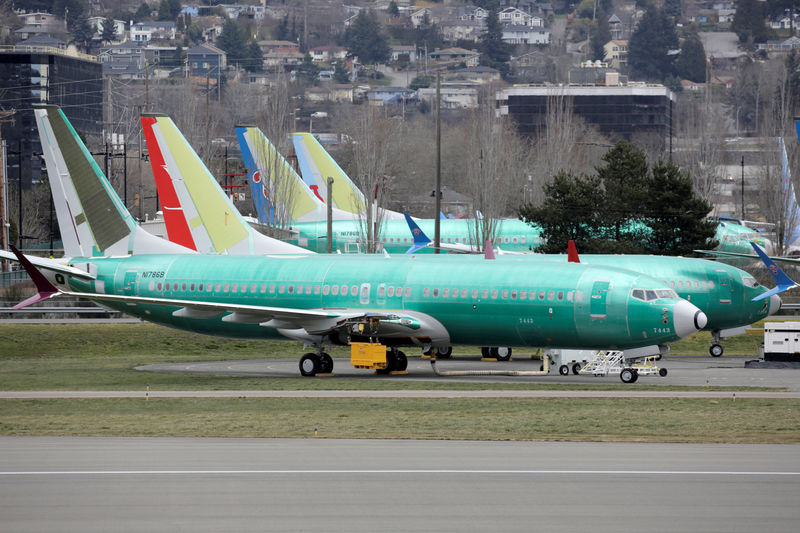By Eric M. Johnson, Tim Hepher and Brenda Goh
SEATTLE/PARIS/SHANGHAI (Reuters) - China's move to ground Boeing (NYSE:BA) Co's 737 MAX jetliners following the deadly Ethiopian Airlines crash has cast a shadow over the American planemaker's immediate hopes for a major jet order linked to a U.S.-China trade deal, industry sources said.
Evidence of a major potential order for more than 100 jets worth well over $10 billion at list prices had risen in recent weeks as Washington and Beijing reported some progress in trade talks to resolve a months-long trade war.
Those expectations were fanned by signs of pent-up demand stemming not only from a drop in China's public purchases as the two sides descended into a tariff war, but also because China placed no private orders for Boeing aircraft in 2018, according to trade and industry sources familiar with the matter.
Now, those sources say it is uncertain how quickly China will be willing to give the 737 MAX the expected new endorsement after ordering its own airlines to stop flying the jet - though much could change as Ethiopian investigators assemble clues to the second deadly crash of the brand-new model in five months.
On Wednesday, the United States joined a wave of nations grounding the 737 MAX in the wake of Sunday's crash in Ethiopia, which killed all 157 people onboard. The planes will be grounded for weeks, U.S. lawmakers said on Thursday.
Analysts said the crash has added uncertainty for America's largest exporter over sales to China.
"It is definitely on their list of concerns because China is Boeing's biggest single export market," Teal Group aerospace analyst Richard Aboulafia said.
Even before the 737 MAX crisis, trade tensions had been widely seen as a growing source of risk for Boeing, which relies on China for one of four of the planes it delivers.
China is poised to overtake the United States as the world's largest aviation market in the next decade and is gobbling up planes made by both Boeing and Airbus while it invests in homegrown aircraft businesses. Boeing sees Chinese demand for 7,700 jets over 20 years worth $1.2 trillion.
While the trade frictions have visibly hurt businesses such as U.S. soybean farmers and Chinese manufacturers, their impact on Boeing has been less clear.
China routinely places large, headline-grabbing jet orders to mark significant diplomatic moments, such as a deal for 300 Boeing jets signed during a visit by Trump to Beijing in 2017.
But analysts say that behind those headlines, such deals contain a mixture of new demand, repeats of older orders and credits against future deals, meaning the impact remains foggy.
The same could apply to any new bout of jet orders announced with a trade peace deal, a former industry negotiator said.
State buyer China Aviation Supplies declined comment.
U.S. President Donald Trump has said he is confident the United States could forge a trade deal with China, but ruled out making any deal that was not in U.S. interests.
It is possible China could also decide to use a large order of Airbus jets to relieve pent-up demand. Orders of European jets have slowed too, partly because Chinese buyers have been wary of wading into the trade row and because the economy is slowing.
An aide to French President Emmanuel Macron said on Thursday there were encouraging signs Airbus was closing in on a long-negotiated deal with China for dozens of narrow-body jets.
SPEAKING SOFTLY
Tit-for-tat tariffs between the U.S. and China, the world's two largest economic powers, have slowed the global economy and forced Boeing to walk a geopolitical tightrope for months.
On the one hand, Boeing has been increasing its industrial footprint in China as it aims to win business and increase its sales lead over Airbus in Asia.
On the other hand, Boeing executives have taken pains to sound measured when publicly discussing trade, in part to avoid clashing with Trump who has repeatedly said the U.S. must take steps to protect American jobs and technology.
One person with knowledge of the matter said before the groundings that Boeing could win a "massive" order led by 737s.
Company data shows Boeing did not win any publicly announced aircraft deals in mainland China last year as the U.S.-Sino trade fight festered into a full-blown trade war.
Just as significantly, trade sources say that for the first time in a number of years, Boeing did not win any new mainland orders of a type that are often booked without either party disclosing the name of the buyer due to complex approvals.
Analysts say any trade or safety ructions are unlikely to disturb a trend that sees China balance aircraft orders over time between Europe and the U.S. to achieve political balance.
But Yang Yingbao, a retired professor from the Nanjing University of Aeronautics and Astronautics, warned that if the trade war went unresolved, the dispute may force China's hand.
"If the U.S. government interferes with the market, and not allow Boeing to smoothly sell planes, this will force China to buy Airbus' planes."

Boeing declined to comment for this story.
